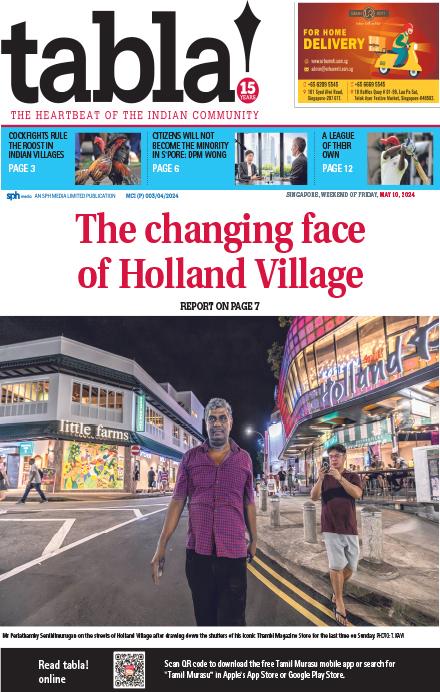ASAD LATIF
I loved Singapore's riches: I did not love Singapore.
The pandemic has taught me this terrible lesson in self-awareness.
Some time after I arrived in 1984, I fell in love with this country. Or so I thought.
I loved its clean roads, safe streets and tall buildings. GDP figures grew like trees through the aspiring towers of Shenton Way. Defying the laws of gravity, growth charts lifted me out of the politics of scarcity into the economics of security.
The building of the MRT embedded me in the mobile geography of an island that expanded unfailingly within its modest borders.
Changi Airport became my interface with a world in which just the mention of Singapore evoked expressions ranging from furtive glances of envy to glad admiration of success.
Believe me, a man prevented me from crossing an Athenian street in 2016 till I could answer two simple questions. Why was resource-poor Singapore, transformed by a British adventurer in 1819, debt-free?
Why were the gifted workers and thinkers of indebted Greece victims of the globalism created by their predecessors in the 5th century BC?
I said that both he and I were parts of a continuum from the city-state of Athens to the city-state of Singapore. What is possible in today's Singapore cannot but be possible many times over in tomorrow's Greece. Give people a chance to make origins come alive again, I said to him.
More than the citizens of successful Singapore, admiring foreigners such as my Athenian interlocutor spoilt me and my relationship with this island city-state.
When I had arrived, I had considered myself a very small part of this country. I was just a foreigner working here.
But the more confident I became of staying on, the more I thought of Singapore as an extension of my self, my needs, my wants, my dreams - of me and me and me.
As in any proprietary love affair, possessiveness rationalised protectiveness. I defended Singapore from apostates within and atheists without.
I challenged taxi drivers, the most intelligent of critical Singaporeans, to redraw the economic landscape so that they and everyone else would reach their destinations faster and richer.
Abroad, I ignored critics. They did not live, work or vote here: Engaging them was a waste of Singaporean time. When they spoke, I nodded mostly, in an Asian kind of way. They thought I agreed with them. I meant I had heard them.
There came a point when a Singaporean friend ribbed me, calling me living proof that the converted preach the loudest. I took his words as a compliment. There is nothing wrong with defending a discovered country, system or faith.
There is nothing wrong, indeed, with transforming belief into propaganda. Propaganda is no more than the propagation of what a person believes to be true. Propaganda is not dishonest.
What is dishonest is false propaganda, the act of propagating what a person knows to be untrue. I never did that. I extolled the quality of life that Singapore's development had made possible. I do so still.
Yet, I made a mistake. It consisted in believing that anything at all belongs to us, not we to that thing.
My error lay in imagining Singapore as a natural amplification of my individual, transitory and egoistic self. Mine was a selfish love.
I was not completely selfish. I did look for the ecological roots of my presence on this land. I found them in leafy reminders of its tropical provenance, in the remonstrating scents of Sentosa's flora and the rural wistfulness of Pulau Ubin.
However, I visited those places as a local tourist, one who belongs to an unrelated part of the same country.
I never sought to become a native inheritor of Sentosian or Ubinite folklore.
Even journeying to Kusu did not cure me of addiction to the urban mythology of high rises, highways and hotels, to the fetishism of development. I remained an insular mainlander.
Development is a necessary but not a sufficient condition of national belonging.
Who does not gain when skyscrapers are filled with industrious workers, arterial traffic flows more smoothly, and tourists staying in local hotels spend Singapore dollars in Orchard Road, Chinatown, Geylang and Little India?
However, for a citizen, which is what I became eventually, his nation must be more than the edifices with which it surrounds him.
He must learn to wrap himself like a blanket around its insecurities, its reverses, its self-doubts and its shivering economy in the global winter.
Faced with a crisis unprecedented since Independence, even an imported citizen like me has become a native species.
Hence, it is time for me to fall in love with Singapore again.
That is not as difficult as it sounds. Love in the 20s, when I came, cannot but mature into love in the 60s, which is what I am now. Countries age, like people do. National relationships do not have to wither but could ripen, much as personal intimacies do.
What Singapore possesses cannot be taken away from it. I mean not just Shenton Way, the MRT or Changi, but the threads of lived affiliation that have woven themselves through physical structures into the fabric of a nation.
Singaporeans are not a here-today, gone-tomorrow kind of people. We are here to stay.
Now that I, too, am here for good, I shall rediscover myself in what will last in Singapore.
While I last.
Asad Latif is an editorial writer for The Straits Times.



